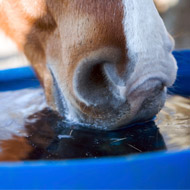Untreated water 'could be source of EHV'

Horses and other susceptible mammals could be infected by herpesviruses from water bodies, long after the animals that shed the virus have left the area.
Berlin researchers have discovered that equine herpesvirus (EHV) can remain stable and infectious over a three-week period, challenging the idea that herpesviruses are relatively unstable outside their host.
The research, published in the journal Scientific Reports, suggests that untreated water could be a source of infection for some herpesviruses.
Enveloped viruses, such as herpesviruses, cause disease when they spread from host to host via aerosol transmission. However, they are generally thought to be unstable in the environment, requiring rapid, direct transfer in order to survive and remain infectious.
Testing this idea, researchers from the Leibniz Institute for Zoo and Wildlife Research spiked water with equine herpesviruses under different conditions over a period of three weeks, to examine whether the virus remained infectious.
The team say the virus did remain stable and infectious for up to three weeks, with pH and temperature being the two key factors in determining how long the viruses survived.
Adding soil to the water appeared to 'pull' the virus out of the water, stabilising it in the soil. This suggests viruses may persist for an extended period of time in natural water bodies. In the case of EHV, horses and other susceptible mammals could be infected by herpesviruses from water bodies, long after the animals that shed the virus have left the area.
Viruses such as EHV may therefore become part of the environmental 'virome' and remain infectious, researchers say. Equine herpesviruses have spread among mammals including polar bears and rhinos, without coming into direct contact with horses or their relatives. This has occurred in captivity and in the wild, according to the Leibniz Institute, often resulting in fatalities. Shared water sources could be a source of, and potential vector for, infection.



 RCVS Knowledge has welcomed Professor Peter Cockcroft as editor-in-chief for Veterinary Evidence.
RCVS Knowledge has welcomed Professor Peter Cockcroft as editor-in-chief for Veterinary Evidence.